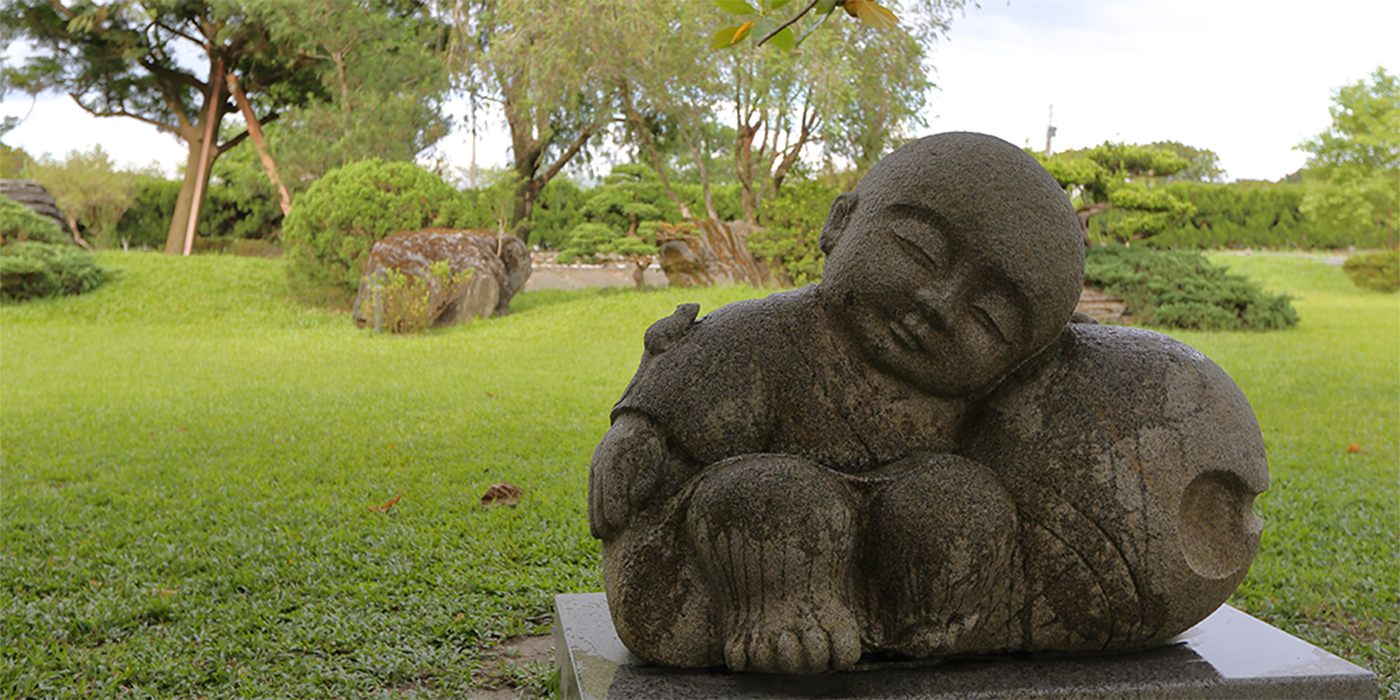With great loving-kindness, we have no regrets; our love is infinite.
With great compassion, we have no complaints; our vows are infinite.
With great joy, we have no worries; our happiness is infinite.
With great equanimity, we give with no expectations; we realize infinite gratitude.
SHARE

The teachings about loving-kindness, compassion, joy, and equanimity are arranged in the order of the years in which the teachings were given:
1983: Loving-kindness, compassion, joy, and equanimity.
1996: Great loving-kindness without regrets, great compassion without resentment, great joy without worries, and great equanimity without expectations.
2008: We must use loving-kindness to guide compassion, compassion to develop discernment, discernment to manifest wisdom, and wisdom to realize impartiality.
2014: Tzu Chi is a way of bodhisattvas in the world. With compassion, we walk the Bodhi Path. By taking joy in the Dharma, we enter the sutra treasury. By attaining equanimity, we realize the teachings of Jing Si. With the Jing Si Dharma Lineage, we perpetuate our wisdom-life; with the Tzu Chi School of Buddhism, we form blessed affinities.
2015: We must pave the path with loving-kindness, build bridges with compassion, guide our direction with great discernment, and set our future course with great wisdom.
2016: With great loving-kindness, we have no regrets; our love is infinite. With great compassion, we have no complaints; our vows are infinite. With great joy, we have no worries; our happiness is infinite. With great equanimity, we give with no expectations; we realize infinite gratitude.
May 1, 2016
Wisdom at Dawn
The Tzu Chi School of Buddhism requires us to have loving-kindness, compassion, joy, and equanimity. “With great loving-kindness, we have no regrets; our love is infinite. With great compassion, we have no complaints; our vows are infinite. With great joy, we have no worries; our happiness is infinite. With great equanimity, we give with no expectations; we realize infinite gratitude.” We must be grateful for the grace of the Buddha, the grace of sentient beings, and the grace of heaven and earth. Since we have so much to be grateful for, we should give with equanimity. Then, as we go among people, we will experience attainment. When we give of ourselves bit by bit with loving-kindness, compassion, joy, and equanimity, even though we give without expecting anything in return, our virtues will slowly come into resonance with the principles.
November 25, 2016
Kaohsiung Faith Corps and Commissioners Certification and Year-end Blessing
The Tzu Chi School of Buddhism requires us to have great loving-kindness, great compassion, great joy, and great equanimity. We must inwardly cultivate sincerity, integrity, faith, and steadfastness, and outwardly practice loving-kindness, compassion, joy, and equanimity. This means we must realize the principles, “With great loving-kindness, we have no regrets; our love is infinite. With great compassion, we have no complaints; our vows are infinite. With great joy, we have no worries; our happiness is infinite. With great equanimity, we give with no expectations; we realize infinite gratitude.”
“With great loving-kindness, we have no regrets; our love is infinite.” Like a loving mother, wouldn’t we all wish happiness for our own children? Since we have taken on the Tathagata’s mission and are willing to go among people to care for all sentient beings, we must have loving-kindness. When ignorance or afflictions arise among people, we will have absolutely no regrets. We must have wisdom and vows, which will naturally allow us to clearly differentiate between right and wrong.
“With great compassion, we have no complaints; our vows are infinite.” We must eliminate the suffering of sentient beings and feel others’ suffering as our own. Whenever I recall the disastrous aftermath of the 921 Earthquake in 1999, the sorrow in my heart is indescribable; it is an “unspeakable sorrow.” Indeed, such extreme sorrow is beyond words, for that kind of pain is impossible to describe. We must devote ourselves to helping suffering sentient beings, without complaints or regrets. This requires us to make vows and maintain the power of these vows.
“With great joy, we have no worries; our happiness is infinite.” We must always be joyful and give unconditionally, and we must also be grateful. There are many people who give unconditionally, like the volunteer bodhisattvas who do recycling work. They work until they are exhausted. They would be lying if they said they were not tired. Yet, they are still very joyful, because the work they do is all for the sake of the earth and sentient beings. We must earnestly serve the earth and humanity.
“With great equanimity, we give with no expectations; we realize infinite gratitude.” If we wish to give of ourselves, we must abandon all desires, like our cravings for taste and our greed for things. If we can let go of these desires, we will no longer need to constantly extract resources from the earth, which causes pollution. It is crucial that we go carbon neutral. This is, of course, very challenging. Yet, if each person is willing to contribute, it will not be too difficult. By continuing to find ways to cut down on our consumption, the effects of climate change will naturally be reduced.
December 29, 2016
Taiwan Northern Region Faith Corps and Commissioner Certification and Year-End Blessing
As Tzu Chi volunteers, we must all inwardly cultivate sincerity, integrity, faith, and steadfastness, and outwardly practice loving-kindness, compassion, joy, and equanimity. Loving-kindness, compassion, joy, and equanimity can be described through the phrases, “With great loving-kindness, we have no regrets; our love is infinite. With great compassion, we have no complaints; our vows are infinite. With great joy, we have no worries; our happiness is infinite. With great equanimity, we give with no expectations; we realize infinite gratitude.” Here, “great loving-kindness” refers to love. If we wish for the whole world to be blessed, we must help those with blessings to create more blessings. We must not sever people’s roots of goodness, but rather enhance everyone’s spiritual aspirations. We cannot start transforming people and stop halfway. If we have not contacted our donors for a while, we must go look for them.
“With great loving-kindness, we have no regrets; our love is infinite.” We must love others and always seek to create blessings. We must not sever their roots of goodness or their spiritual aspirations.
“With great compassion, we have no complaints; our vows are infinite.” The affinities of bodhisattvas are with suffering sentient beings. To alleviate their suffering truly requires a tremendous amount of energy. I know this is very difficult. However, since we wish to become bodhisattvas, we absolutely must alleviate the suffering of sentient beings. Therefore, we must deliver sentient beings with great compassion without complaints or regrets.
“With great joy, we have no worries; our happiness is infinite.” We must give without expectations, and we must also be grateful. We feel grateful for the many people who have come to help us succeed. This is like how Sakyamuni Buddha said that without Devadatta, he would not have attained buddhahood so early. Thus, when we serve others, we need to be grateful that they have accepted our help in the midst of their suffering.
“With great equanimity, we give with no expectations; we realize infinite gratitude.” When we give without expectations, we will truly have infinite gratitude. When we are grateful to others and others are also grateful to us, these are our spiritual provisions for attaining buddhahood in the future.
January 27, 2018
Hsinchu Area Faith Corps and Commissioner Certification and Year-end Blessing
Tzu Chi volunteers, from the moment they are certified, must all inwardly cultivate sincerity, integrity, faith, and steadfastness, and outwardly practice loving-kindness, compassion, joy, and equanimity. We must make great vows to transform sentient beings, eliminate afflictions, learn all Dharma doors, and seek to attain buddhahood. This is everyone’s direction. Thus, we must practice according to the principles, “With great loving-kindness, we have no regrets; our love is infinite. With great compassion, we have no complaints; our vows are infinite. With great joy, we have no worries; our happiness is infinite. With great equanimity, we give with no expectations; we realize infinite gratitude.” At all times, we must have loving-kindness, compassion, joy, and equanimity without complaints or regrets.
When we are free of regrets, complaints, worries, or expectations, we can give of ourselves without limit. As we open up our hearts, our lifespans will also become boundless. We must not limit ourselves by the length of our lives; instead, we must simply give whatever we are able to give. We must make the most of the time in our lives to attain wisdom and grow our wisdom-life.
